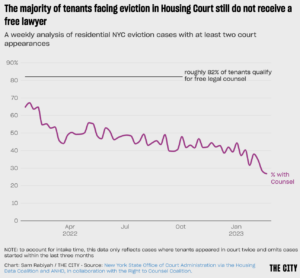Tenants Take Over Bronx and Brooklyn Housing Courts, Protesting Lack of Lawyers
Sam Rabiyah and Jonathan Custodio, The City
 This article was originally published on by THE CITY
This article was originally published on by THE CITY
/cdn.vox-cdn.com/uploads/chorus_asset/file/24693519/053123_housing_court_rtc_protest_2.jpg)
Tenant groups staged a pair of singalong protests at housing courts in The Bronx and Brooklyn on Wednesday morning, pairing a surprise disruption inside each building with publicly planned rallies outside.
The tactic was a way to escalate their demand that New York City live up to its new Right to Counsel law, which aims to ensure free attorneys for all low-income tenants facing eviction.
Since a pandemic eviction moratorium was lifted in January 2022, 45,796 eviction cases have moved forward in Housing Court, including nearly 25,000 in which the tenant did not have an attorney. Marshals have meanwhile executed over 6,000 residential evictions.
In Brooklyn’s court on Livingston Street, City Councilmember Sandy Nurse (D-Brooklyn) joined leaders from Flatbush Tenant Coalition, Housing Organizers for People Empowerment and Crown Heights Tenant Union in a hallway outside the sixth-floor courtrooms.
/cdn.vox-cdn.com/uploads/chorus_asset/file/24693522/053123_housing_court_rtc_protest_nurse_1.jpg)
“Tenants have the power, we shall not be moved,” they sang, updating the lyrics of the slave spiritual turned protest ballad. “Judge Wilson, end evictions, we shall not be moved.”
Tenants, lawyers and court staff watched, some tapping their feet to the beat or recording video on their phones. The singers circled the space, then weaved their way to the stairwells to descend to the fifth floor, and then the fourth, before court officers escorted them out of the building after telling a legal observer that protesters would be handcuffed if they didn’t exit.
As the court officers followed the protesters out, Thern Shivers, a Flatbush Tenant Coalition leader, addressed them: “Workers of the court and these police officers who want to be aggressive and hostile to people fighting for their rights, this could be you tomorrow.”
The crowd outside included dozens of tenant organizers and activists, as well as Brooklyn Democratic Councilmembers Alexa Avilés, Crystal Hudson and Lincoln Restler. The elected officials’ remarks focused on the lack of funding for attorneys to represent low-income tenants.
The current city budget provided $110 million to pay Right to Counsel attorneys — a fraction of the $451 million that advocates say is needed to provide lawyers to every qualifying tenant.
“Our city has that money,” Avilés told the crowd, pointing to the $711 million City Council budgeted for police overtime last year. She added: “There is no other program in New York City that demonstrates this kind of success.”
/cdn.vox-cdn.com/uploads/chorus_asset/file/24693530/053123_housing_court_rtc_protest_1.jpg)
Tenant advocates are still calling on the state court system to pause eligible eviction cases until tenants get access to a right to counsel lawyer, as THE CITY previously reported. But in the meantime, money is “the one thing that the City Council and the mayor can do,” Susanna Blankley, coordinator for the Right to Counsel NYC Coalition, told THE CITY.
A similar scene played out at Bronx Housing Court in Concourse Village, as about a dozen tenant leaders from the Northwest Bronx Community and Clergy Coalition as well as Community Action for Safe Apartments (CASA) sang and chanted in English and Spanish in the bustling fifth-floor hallway.
The fifth floor of the Bronx housing court is one of the places where evictions go forward every day, but NOT THIS MORNING pic.twitter.com/WxlkNjNMkO
— #EvictionFreeBX CASA-New Settlement (@CASAbronx) May 31, 2023
That action continued for about five minutes before court officers escorted the protesters outside, where demonstrators joined a rally attended by Bronx Democratic Councilmembers Jennifer Gutiérrez and Pierina Sanchez, who chairs the council’s Committee on Housing and Buildings.
“We at City Hall have a responsibility to fund, fully fund, Right to Counsel,” Sanchez said.
“Stable housing is the way that you take care of communities and keep people safe. That is what we’re fighting for. That is why we’re here,” she continued. “This is about the system that is not working for the lowest-income people.”
Lucian Chalfen, a spokesperson for the state courts, said that staffing challenges affect availability of counsel.
“What the legal services providers have communicated to us is that they have experienced profound levels of attrition and that resulting shortages of staff have kept them from being able to represent all eligible tenants,” Chalfen said.
He added that the court system allows for the practice of adjourning new cases “for an evaluation of a tenant’s eligibility for representation.”
Hardly Halfway There
Mayor Bill de Blasio signed the Right to Counsel law in 2017. At the time, it covered ZIP codes in each borough with especially high eviction rates. It then expanded to all income-eligible tenants in 2021.
The law provides a free attorney to any tenant with an income of 200% of the federal poverty level or less. Independent research estimated that 82% of tenants in eviction cases would be eligible.
The city’s Human Resources Administration determined that 84% of tenants with legal representation were able to stay in their homes.
Yet THE CITY reported last fall, once the law was in full effect, that only 36% of tenants facing an eviction had a lawyer after appearing in court — a share that includes people who paid for their own lawyers — compared to 98% of landlords. The most recent data from the courts show that, even after two court appearances, only 46% of tenants had representation in eviction cases initiated since January 2022.

“RTC is a right we won,” said Marisol Morales, a Bronx tenant and CASA member currently facing an eviction case in Housing Court. “The state and the courts have both the responsibility and ability to make it so.”
THE CITY is an independent, nonprofit news outlet dedicated to hard-hitting reporting that serves the people of New York.